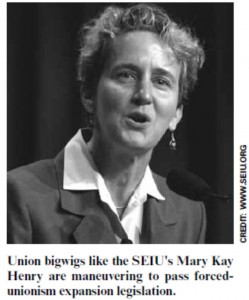Is This Any Way to Run a City’s Schools?
Leaked CTU Proposals Won’t Do Anything to Improve Schools’ Poor Performance
Big Labor ‘Organizing’ Strategy Reliant on Washington, D.C.
Nationwide unemployment hovers near 10%. (U.S. DOL reports unemployment rate of 9.9% for April 2010) Across America today, there is widespread hardship resulting from most businesses’ lingering inability to hire more workers profitably even as the country emerges from the 2008-2009 recession.
 What is the response of Big Labor politicians in Washington, D.C.? Sadly, they appear determined to make matters worse.
What is the response of Big Labor politicians in Washington, D.C.? Sadly, they appear determined to make matters worse.
Last month, union-label U.S. Sen. Claire McCaskill (Mo.) admitted to the Hill, a D.C. Beltway publication, that she and other members of her chamber’s Democratic majority were working behind the scenes to concoct an “alternative” version of the mislabeled “Employee Free Choice Act” for floor action this year.
In its current form, this legislation (S.560/H.R.1409) is designed to help union bosses sharply increase the share of all private-sector workers who are under union monopoly control by effectively ending secret-ballot elections in union organizing campaigns.
However, the National Right to Work Committee and its allies have mobilized massive public opposition to the measure, greatly lowering its prospects for passage in its current form.
Monopoly Unionism Negatively Correlated With Private-Sector Job Growth
In response, as Ms. McCaskill recently acknowledged, Big Labor politicians and union lobbyists are now concocting new legislation designed to accomplish the same objective through somewhat different means.
“The Committee and its 2.5 million members have led the opposition to S.560/H.R.1409, because this scheme would greatly exacerbate the harm caused by the current forced-unionism provisions in federal labor law,” commented Right to Work Vice President Doug Stafford.
“The ‘Plan B’ forced-unionism expansion legislation now being hammered out by Big Labor Sen. Tom Harkin [D-Iowa] and cohorts like Claire McCaskill would greatly intensify workplace elections’ bias in favor of union organizers. In the end, it could prove even more harmful than ‘Plan A.’
“And experience indicates enactment of either ‘Plan A’ or ‘Plan B’ would drastically reduce employment opportunities in addition to taking away the freedom of now-independent workers.
“For example, as a group, the 10 states with the highest shares of their private-sector employees under union monopoly-bargaining in 2004 suffered a private-sector job decline of 2.5% over the following five years.
“Meanwhile, the 10 states with the lowest private-sector unionization experienced an aggregate private-sector job gain of 1.9%.
“Incredibly, the avowed goal of S.560 lead sponsor Harkin and other Big Labor politicians in Congress is to ‘level the playing field’ by bringing all states down to the level of forced-unionism strongholds like Illinois, Michigan, and New Jersey.”
Union Bigwigs Calculate ‘Plan B’ Can Muster Necessary 60 Senate Votes
Mr. Stafford continued: “Rewriting federal labor law to make Texas’s private-sector unionization rate as high as California’s is today would certainly be a radical move.
“But union bigwigs like incoming Service Employees International Union [SEIU] chief Mary Kay Henry believe that, by dropping S.560’s ‘card check’ provision and modifying others, they can muster the 60 votes they need to bring up this power grab for a final Senate roll call.
“If that happens, it will be virtually impossible to stop the bill from being passed and sent to the White House.
“That’s why Right to Work supporters must not let their guard down.
“However, as long as Committee members and supporters keep turning up the heat on Congress with their postcards, phone calls, signed letters and petitions, I’m confident ‘Plan B’ as well as ‘Plan A’ can be defeated.”
Mr. Stafford urged Right to Work members to continue contacting their senators and congressmen through the Congressional Switchboard, 202-224-3121 and 202-225-3121, asking them to oppose S.560/H.R.1409 and all similar legislation on all votes.

Leaked CTU Proposals Won’t Do Anything to Improve Schools’ Poor Performance

Wherever Big Labor wields the power to collect forced union dues, union bosses funnel a large share of the confiscated money into efforts to elect and reelect business-bashing politicians. Employment growth tends to lag as a consequence.

Members Insist They Keep Pro-Right to Work Campaign Promises